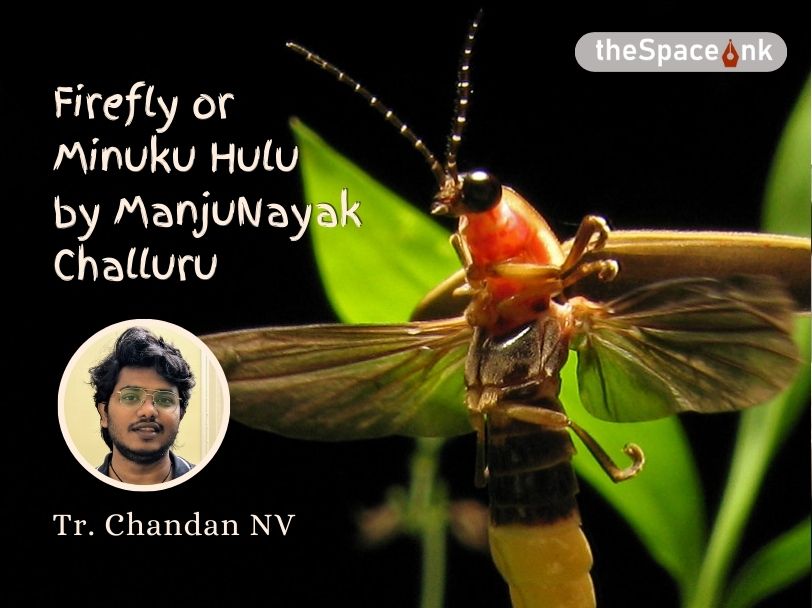Doiboki is a fisherwoman who sells her wares everyday at the city market and returns to her village in the evening. One day she was unusually late. She started walking back home all by herself. Continued from Part I.
Translated from Assamese by Ranjita Biswas.
Doiboki walked faster now. Once she crossed the shrine and reached the bridge, she could sigh in relief. She felt safe in her village, noisy though with the sounds of routine quarrels in the houses, yelling drunkards, children crying, or a husband beating up a wife.
A garland of lightning streaked through the dark sky. In that sudden light she saw a yellow and black striped Bakraj snake slowly crossing the path. Suddenly, three army trucks broke through the darkness. Doiboki stood aside, hiding. She saw from her position that the truck in the middle of the convoy ran over the snake, smashing it to pieces. Thunderclaps resounded through the air; the lightning was getting more frequent. As she looked at the carcass of the snake in the light of the streaking lightning, somehow even she, who was never known to have fear for anything, shook with apprehension. Had her man lived, she would never have had to go out like this in search of a few rupees. As she remembered how her husband, a healthy strong man, left them all after just a week of ailing with cholera, two streams of tears glided down her smooth cheeks like water on a catfish.
The area around the temple was pretty spread out. On one side was the shrine and on the other, the paddy fields. Even at daytime, a feeble minded person would balk while crossing this particular patch. Usually when Doiboki and the other women returned from the bazaar, the high caste ladies of the village sat outside the premises of the shrine singing in praise of the Lord. This particular naamghar (1) forbade women to enter the sanctum sanctorum. So the fruits and other offerings, the earthen lamps they lit, had to be taken to the inner quarters by a priest while the women paid obeisance kneeling on the steps to the shrine. In the summer months, Doiboki and her friends sat down under the peepal tree to enjoy the cool breeze. Sometimes, a woman of the group would even give them some food from the offerings while passing by. At times, they even asked Doiboki and her friends about the day’s catch. Somebody would say, “Doiboki, my daughter and son-in-law are coming. See that I get some fresh fish.” When the fisherwomen crossed the bridge the last rays of sun made their dark bodies shine like ripe black berries.
By the time Doiboki reached the area around the naamghar, even the last flickers of light from the distant cottages disappeared and she merged with the impenetrable darkness. She put a betel-nut and betel leaf in her mouth. She was never this late. Till now, the fish vendors were giving good value for money, so they did not have any problem. But of late, the men were acting funny. Today when they offered a ridiculous price for the jumping, fresh Kurhis, fat with eggs, her anger knew no bounds. Now she abused them to her heart’s content with the choicest expletives she knew. But while about to spit out the red spittle from the betel nut mix, she stopped. To the opposite of the namghar a few sharp streaks of light were going up and down like Kandhuli fish on a rampage. Immediately, she threw herself to the ground. The cloudburst and the lightning were getting even more frequent. She folded her hands towards the shrine and begged, “What’s going to happen now, O Probhu!” There was a narrow bamboo bridge leading to the shrine. She sat down there. She could see in the sudden streaks of light that the soldiers were searching the field, like the villagers who went looking for fish armed with cane baskets and sharp poles. There seemed to be a juicy Ragha-borali fish in their net. She could hear some sounds, as if they were torturing somebody. She started shaking violently. She remembered the smattered Bakraj. The streaks of light were like Kandhuli fish again. The army jawans were now no more in a single line, they were spread out and they were moving forward aggressively. Doiboki’s hands were on the bamboo gate to the shrine. The soldiers were coming; they were coming towards her in the dark. Doiboki tried to push the gate but she shivered. What was she trying to do? How could she think of entering the holy place? She felt as if the gate was not made of bamboo, but it was a wall of stone. People said that at night a golden boat was seen floating on the ponds. Whoever saw it died the next day vomiting blood. If something happened to her, how would that blind woman fend for herself ? And, her still young children? She opened the gate forcefully and ran to the shadow of the peepal tree. The soldiers were now on the road. A streak of light bathed her briefly. Instantly a gritty voice shouted, “Who’s there?” She squeezed herself into the hollow of the tree. Sound of boots. Then the trucks started up simultaneously. After some time, they left, going towards the town, their lights turning the night into a day.
By the time Doiboki reached the area around the naamghar, even the last flickers of light from the distant cottages disappeared and she merged with the impenetrable darkness. She put a betel-nut and betel leaf in her mouth. She was never this late. Till now, the fish vendors were giving good value for money, so they did not have any problem. But of late, the men were acting funny. Today when they offered a ridiculous price for the jumping, fresh Kurhis, fat with eggs, her anger knew no bounds.
There must have been a nest of ants inside the hollow. Now her presence made them stir, and she could feel a few crawling on her back. A few even bit her. Even without seeing them Doiboki knew that they were of the huge black species. She could smell their eggs and felt like vomiting. She bolted out from the hollow. She could see the water in the ponds in the lightning. She took off the sador (2) from her body. The heat made her feel like a fish roasting on a stove. Her throat was constricted with thirst. She was desperate for water to drink, even if a few drops; otherwise her heart would stop. Should she slake her thirst with the water from Ganga-Jamuna? She went towards the ponds. She could hear a sound coming from the water.
It vanished as soon as there was a distinctive slithering sound on the bank of the Jamuna. She felt her heart thumping. They said in the village that when Podo’s brother was returning home late he heard the splashing sound from the ponds and wanted to see the pair of turtles. It was a moonlit night and when he called out to them, Doiboki and Jasudha came to the bridge. He was gulping down fried chana nuts and threw some of them at the pair. But he was bitten by the one who adorns the God Shiva and turned blue. She could hear the scraping sound disappearing to the hollow of the peepal tree. What was that one looking for? She had left her signature fishy smell behind in the black ants’ nest. She had heard that the villagers had refused to touch the body of Podu’s brother. What had happened to the body then? She had never asked anyone. Was it devoured by crows and eagles? She touched herself. It was slippery with perspiration. She wiped her face with her palms, smelling strongly of the egg-filled Kurhi fish. Oh, she was smelling foul all right.

She ran her tongue on her dry lips. She must drink a few drops of water. She went down to the bridge between the ponds and bent down to take a handful of water but she stopped. She couldn’t do it. How could she, with these unclean hands smelling of fish? She dropped down on the bridge; her feet touched the cool water. Like a Cheng fish jumping out of the fishing rod her hand jumped out from her body to the water. She took a handful of water and gulped the water thirstily. She sprinkled a little water on her head and murmured, “Please forgive me, Lord, if I have committed a sin.” She got up to go, her feet left a few ripples on the water. There was no sound anywhere, the cloudbursts had stopped and the sky was black like her body. The leaves of the trees were stock-still. Suddenly, there was a splashing sound in the water. She pricked her ears to catch the sound better. It was not the familiar sound of fish swimming in the water. Doiboki could feel her skin go cold with fear. Who had said that? Who had said that on some nights a golden boat floated on the waters of Ganga-Jamuna? The boat was guarded by the two turtles with moss on their backs. People said the reason for her husband’s death was still a mystery.
On that darkest of the nights when it was drizzling steadily, he had gone out to the field opposite the shrine without listening to the warning because he heard that a great school of Kawoi had swam up there. When he returned the next morning, he had his basket full of reddish Kawoi, each big enough to fill a palm. But by then he was passing stool full of blood. People whispered that he had witnessed the golden boat on that dark night. Otherwise, how could a strong and healthy man like him die so suddenly? Looking at the blobs of blood spread across the courtyard her mother-in-law had howled, ‘Oh, why did he have to be greedy like that, and on the anniversary of his father’s death too? Why did he have to go near the magic place? So what if the kawoi were in hordes? Greed, what greed!’ Then her mother-in-law had accused her of the vilest of abuses. Even now in the silence of the night, she could hear her mother-in-law’s voice, ‘Greedy, what greed!” She too was greedy beyond reason. The notes in the knot of her mekhela seemed like hot coals burning through her; they felt like the poisonous Soraat leaves ripping through her skin.
They said in the village that when Podo’s brother was returning home late he heard the splashing sound from the ponds and wanted to see the pair of turtles. It was a moonlit night and when he called out to them, Doiboki and Jasudha came to the bridge. He was gulping down fried chana nuts and threw some of them at the pair. But he was bitten by the one who adorns the God Shiva and turned blue.
The ripples in the water were increasing in volume. Doiboki could feel the drops of water sprinkled on her feet. By now her eyes were used to the darkness. She saw a huge turtle near the bridge. Doiboki jumped up from the water like a kawoi escaping from a bamboo basket. Her whole body was shaking, she was on her knees, bowed down in fear. The turtle was still waiting in the shallow water near the bridge. Doiboki was scared to look there. Now, she thought, a magical golden boat would come up; anybody who saw it would vomit blood and die. Again she heard the sound of water splashing. Yes, the boat was to be guarded by two turtles. She ran towards the naamghar, not daring to look back. She stopped near the door. This was where the women from the higher caste sat to sing hymns in praise of the Lord. The women were beautiful like the crimson Senduri-puthi fish, fair like Pava fish , and they wore clothes gleaming like the scales of the Mirika fish. From her childhood she had seen them. She sat down on that spot, her head between her knees. Thankfully, the noise from the water had stopped. Reluctantly, she glanced towards the interior of the naamghar. Flickering lights from a group of fireflies were going off and on. Again, she bent on her knees paying obeisance as she looked at the holy shrine.
Slowly, she took a few steps to be on her way home. But suddenly, a wind rose up to rustle the leaves. The fat raindrops which were waiting to fall all this time now descended in great gusto. She was about to leave the compound but now she had to retrace her steps. She waited on the spot where the women from the village held their ritual, the rain drenching her. Now she could hear the tin roof of the temple resound with falling hailstorms. As big as round limes, they attacked Doiboki mercilessly. Doiboki knew that only the sanctum sanctorum had a lock. The gate to the open space where people congregate for the chanting of prayers was kept open. She hesitated as she stood near the door. She could not bear the torture any more. She went inside, but came out again. Again the rain and hailstorm attacked her. Her tired body could not take it any longer. Step by step she entered the temple’s precinct.
Final episode on 8 May 2023.
Notes:
- Naamghar: temple
- Sador: The unstitched cloth worn wrapped over the mekhela
Arupa Patangia Kalita is one of the foremost contemporary writers of Assam. Her writings reflect many facets of Assamese life. She has received numerous literary awards including the Sahitya Akademi Award in 2014. Her books have been translated into multiple Indian regional languages and also feature as study material in some colleges.








